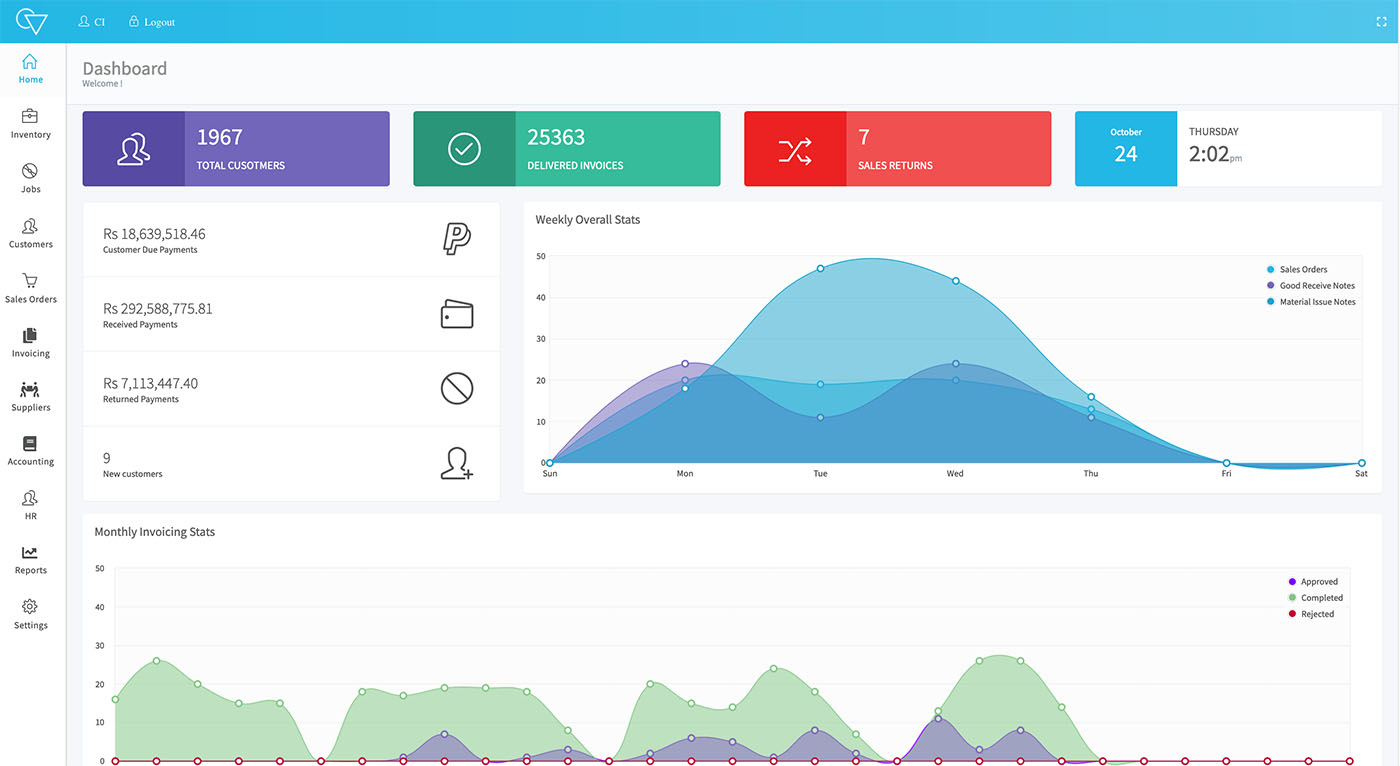Cloud based inventory management small business – Cloud-based inventory management small business, an innovative approach to inventory management, is revolutionizing the way small businesses operate. This technology offers a plethora of benefits, empowering businesses to streamline their operations, reduce costs, and gain a competitive edge.
Cloud-based inventory management systems provide real-time visibility into inventory levels, enabling businesses to make informed decisions about restocking and production. They also facilitate collaboration and communication within teams, ensuring that everyone has access to the most up-to-date information.
Cloud-Based Inventory Management Systems for Small Businesses: Cloud Based Inventory Management Small Business
For small businesses, inventory management is a crucial aspect of operations, as it directly impacts profitability, customer satisfaction, and overall efficiency. Cloud-based inventory management systems offer a range of benefits that can streamline operations and empower small businesses to compete effectively.
Benefits of Cloud-Based Inventory Management Systems
- Real-time Inventory Visibility: Cloud-based systems provide real-time visibility into inventory levels across multiple locations, allowing businesses to make informed decisions based on accurate data.
- Improved Accuracy: By eliminating manual processes and automating inventory updates, cloud-based systems reduce errors and improve the accuracy of inventory records.
- Enhanced Collaboration: Multiple users can access and update inventory data simultaneously, facilitating collaboration and communication within the team.
- Scalability: Cloud-based systems can be easily scaled up or down to meet changing business needs, making them suitable for both small and growing businesses.
- Cost-Effective: Compared to traditional on-premise systems, cloud-based inventory management systems offer a more cost-effective solution, eliminating the need for hardware, software, and IT support.
Examples of Cloud-Based Inventory Management Systems for Small Businesses, Cloud based inventory management small business
Several cloud-based inventory management systems are tailored specifically for small businesses, offering a range of features and functionalities to meet their unique needs.
- Zoho Inventory: A comprehensive inventory management solution that offers features such as inventory tracking, order management, and sales reporting.
- Fishbowl Inventory: A robust inventory management system designed for small to mid-sized businesses, with advanced features such as barcode scanning and multi-warehouse management.
- DEAR Inventory: A cloud-based inventory management and accounting system that provides real-time inventory visibility, multi-currency support, and advanced reporting capabilities.
Key Features and Functionalities of Cloud-Based Inventory Management Systems
Cloud-based inventory management systems typically offer a range of features and functionalities that are essential for small businesses, including:
- Inventory Tracking: Track inventory levels across multiple locations, including stock levels, reorder points, and lead times.
- Order Management: Manage sales orders, purchase orders, and backorders, ensuring timely order fulfillment.
- Warehouse Management: Manage multiple warehouses, including inventory allocation, picking, and packing.
- Reporting and Analytics: Generate reports and analytics on inventory performance, sales trends, and customer behavior.
- Integrations: Integrate with other business applications, such as accounting software, e-commerce platforms, and CRM systems.
Benefits of Cloud-Based Inventory Management

Cloud-based inventory management systems offer a plethora of advantages that can revolutionize inventory management for small businesses. These systems provide enhanced accuracy, efficiency, and cost savings, making them an indispensable tool for businesses looking to optimize their operations.
Real-Time Inventory Tracking
One of the key benefits of cloud-based inventory management systems is their ability to track inventory levels in real-time. This eliminates the need for manual inventory counts, reducing the risk of errors and ensuring that businesses always have an accurate picture of their stock levels. Real-time inventory tracking also enables businesses to respond quickly to changes in demand, preventing stockouts and overstocking.
Improved Collaboration and Communication
Cloud-based inventory management systems facilitate collaboration and communication within teams by providing a centralized platform for sharing inventory data. This allows multiple users to access and update inventory information in real-time, ensuring that everyone is working with the most up-to-date information. The ability to share inventory data also improves communication between different departments, such as sales, purchasing, and warehousing, ensuring that everyone is on the same page.
Choosing the Right Cloud-Based Inventory Management System
Selecting the ideal cloud-based inventory management system for your small business requires careful consideration. Here’s a comprehensive guide to assist you in making an informed decision:
Compare Different Systems
Research and compare various cloud-based inventory management systems. Consider their features, pricing models, customer support, and user reviews. A comparison table can help you visualize the key differences between systems.
Evaluate Business Needs
Before choosing a system, thoroughly evaluate your business’s unique inventory management needs. Consider factors such as the volume and complexity of your inventory, the number of users, and the level of customization required.
Match System to Needs
Align your business needs with the capabilities of the inventory management system. For example, if you require advanced features like multi-location inventory tracking or barcode scanning, ensure the system you choose offers these functionalities.
Consider Implementation and Support
The implementation process and ongoing support are crucial factors to consider. Choose a system with a user-friendly interface and reliable technical support to minimize disruptions and ensure smooth operations.
Implementing a Cloud-Based Inventory Management System

Implementing a cloud-based inventory management system can streamline your inventory management processes, improve accuracy, and save you time and money. Here’s a step-by-step guide to help you get started:
1. Choose the right system. There are many different cloud-based inventory management systems available, so it’s important to do your research and choose one that’s right for your business. Consider your business size, the types of products you sell, and your budget.
2. Migrate your data. Once you’ve chosen a system, you’ll need to migrate your existing inventory data into the new system. This can be a complex process, so it’s important to follow the instructions provided by your software vendor carefully.
3. Integrate your system with your other business systems. Your inventory management system should be integrated with your other business systems, such as your accounting system and your e-commerce platform. This will help you to automate your inventory management processes and improve accuracy.
4. Train your staff. Once your system is up and running, you’ll need to train your staff on how to use it. This will help to ensure that your staff is using the system correctly and that they’re getting the most out of it.
5. Monitor your system. Once your system is implemented, you’ll need to monitor it regularly to make sure that it’s working properly. This will help you to identify any problems early on and take corrective action.
Case Studies and Success Stories
Numerous small businesses have experienced remarkable success by adopting cloud-based inventory management systems. These case studies provide valuable insights into the tangible benefits and positive outcomes achieved by these businesses.
One notable example is a small retail store that struggled with inventory inaccuracies and manual processes. After implementing a cloud-based system, they reduced inventory discrepancies by 90%, leading to increased sales and improved customer satisfaction.
Key Takeaways:
- Improved inventory accuracy leads to increased sales and customer satisfaction.
- Cloud-based systems provide real-time visibility into inventory levels, allowing for timely decision-making.
Future Trends in Cloud-Based Inventory Management
The future of cloud-based inventory management is bright, with emerging technologies such as artificial intelligence (AI) and machine learning (ML) poised to revolutionize the way businesses manage their inventory. These technologies offer a range of potential benefits, including improved accuracy, efficiency, and cost savings.
One of the most significant trends in cloud-based inventory management is the use of AI to automate tasks and improve decision-making. AI-powered systems can be used to track inventory levels, forecast demand, and generate purchase orders. This can free up small business owners to focus on other tasks, such as growing their business.
ML is another important trend in cloud-based inventory management. ML algorithms can be used to identify patterns and trends in inventory data. This information can be used to improve forecasting accuracy and make better decisions about inventory levels.
Potential Benefits of AI and ML for Small Businesses
- Improved accuracy: AI and ML can help businesses to improve the accuracy of their inventory data. This can lead to reduced losses due to overstocking or understocking.
- Increased efficiency: AI and ML can help businesses to automate tasks and improve the efficiency of their inventory management processes. This can free up time for employees to focus on other tasks.
- Cost savings: AI and ML can help businesses to reduce costs by optimizing inventory levels and reducing waste. This can lead to improved profitability.
Challenges of AI and ML for Small Businesses
- Cost: AI and ML systems can be expensive to implement and maintain. This can be a challenge for small businesses with limited resources.
- Complexity: AI and ML systems can be complex to implement and use. This can be a challenge for small businesses with limited technical expertise.
- Data quality: AI and ML systems rely on data to learn and improve. This can be a challenge for small businesses with limited data or data of poor quality.
How Businesses Can Prepare for and Leverage These Trends
- Start small: Businesses do not need to implement a full-blown AI or ML system all at once. They can start by implementing a few simple use cases, such as using AI to track inventory levels or using ML to forecast demand.
- Get help from experts: If businesses do not have the internal expertise to implement an AI or ML system, they can get help from experts. There are many companies that offer consulting and implementation services for AI and ML systems.
- Be patient: AI and ML systems take time to learn and improve. Businesses should not expect to see results overnight. They need to be patient and give the system time to learn and improve.
Closing Notes

In conclusion, cloud-based inventory management is an essential tool for small businesses looking to optimize their operations and achieve success. By embracing this technology, businesses can gain a competitive advantage, improve customer satisfaction, and set themselves up for long-term growth.
Common Queries
What are the key benefits of cloud-based inventory management systems for small businesses?
Cloud-based inventory management systems offer numerous benefits for small businesses, including improved accuracy, efficiency, cost savings, real-time inventory tracking, and enhanced collaboration.
How do cloud-based inventory management systems help businesses track inventory levels in real-time?
Cloud-based systems provide real-time visibility into inventory levels across multiple locations, allowing businesses to make informed decisions about restocking and production.
What are some tips for choosing the right cloud-based inventory management system for a small business?
When selecting a cloud-based inventory management system, small businesses should consider their specific needs, budget, and the features and functionalities offered by different systems.